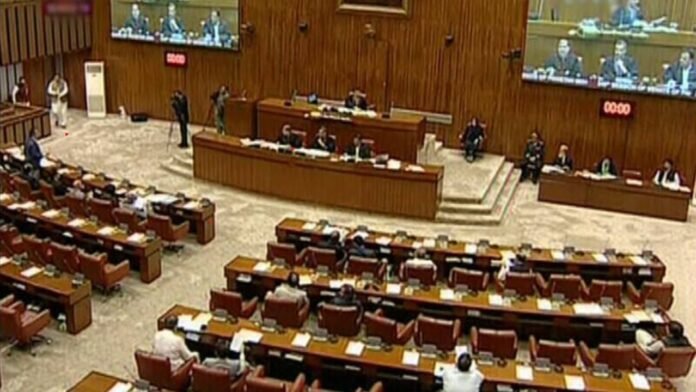Islamabad: By majority vote, the Senate has approved the Election Act Amendment Bill 2024, a significant legislative change with potentially far-reaching implications for the forthcoming elections. Once it gets approval, this bill allows the Election Commission to nominate retired judges of the High Court as tribunals to make election adjudication more efficient and credible. The bill modifies Section 140 of the Election Act, focusing on updating and refining Pakistan’s legal framework governing elections.
However, there were many hurdles during this approval stage, too. Intense opposition protests characterized the sit-in. Their opposition was shown through a token walkout from the House that symbolizes their total disagreement. They didn’t stop there; they chanted, tore up papers, and banged desks, leading to chaos and disorderliness. Suppose one would think that they wanted to turn into a riotous mob while deliberating on issues related to governance. Senator Anwarul Haq Kakar refused to walk out, showing a possible fissure in opposition or another tactical approach.
Despite an earlier boycott, the opposition returned to the house shortly afterward, ensuring its presence within legislative procedures during demonstrations against this legislation. Such a return might imply that they acknowledge its importance and must engage in discussions even when expressing anger.
On behalf of his opposition colleagues, Senator Ali Zafar questioned the government’s intentions and argued that these proposals were made in bad faith. Claiming that such reforms let authorities manipulate the voting process to benefit themselves. Opposition Leader Shibli Faraz also expressed similar sentiments about the Law Minister’s arrogant attitude towards them. Along with other members shouting him down during sessions. He said confidence comes from having majority numbers, which is why he can pass any law without being able to consider opposite opinions.
In addition, he raised concerns about the controversial 8th February elections. Which he referred to as the most disputed general elections of the century. This declaration shows that people do not trust those in power and that political divisions have continued since. The opposition still questions the fairness and legality of this country’s electoral procedures.
On the other hand, Law Minister Azam Nazeer Tarar defended the bill, arguing that it was needed to fast-track decision-making by election tribunals. According to him, this law would guarantee faster settlement of disputes resulting from parliamentary elections, thereby strengthening democracy. He also swiped at his opponents, primarily those he claimed did wrong during elections. The Daska election was one such instance in which he mentioned that some past perpetrators of electoral malpractice have turned into moral lecturers for the government regarding electoral honesty.
Consequently, this is a significant moment reflecting both continued efforts to reform Pakistan’s electoral system. And deep chasms within its legislative process. The government sees engaging retired High Court judges in the election tribunal as a way to improve judicial oversight of polls. That will be more reliable and faster in dealing with controversies. However, strong opposition against it and allegations of ill intentions point out that. The implementation process of this bill and its influence on future voting processes will attract due attention and criticism.
The political theatre in the bill’s passage also illustrates how controversial electoral reforms are in Pakistan. The trust deficit between the government and the opposition remains a considerable obstacle to achieving common ground on election matters. Accusations of past electoral thefts and current manipulation are flying across the aisle. In the months ahead, there will probably be more debates. And perhaps more legislative changes as both sides negotiate through Pakistan’s intricate democratic terrain.


